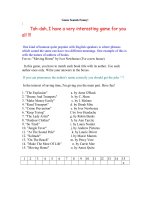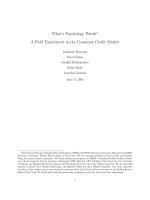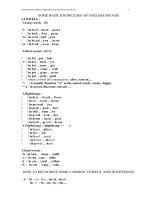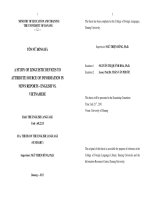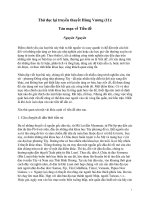STRONG SOUNDS vs WEAK SOUNDS
Bạn đang xem bản rút gọn của tài liệu. Xem và tải ngay bản đầy đủ của tài liệu tại đây (802.62 KB, 2 trang )
<span class='text_page_counter'>(1)</span>STRONG VS WEAK FORMS Grammatical words are words that help us construct the sentence but they don't mean anything: articles, prepositions, conjunctions, auxiliary verbs, etc. These words have no stress, and so they are weakened. That weakened form is called "weak form" as opposed to a "strong form", which is the full form of the word pronounced with stress. The strong form only happens when we pronounce the words alone, or when we emphasize them. Weak forms are very often pronounced with a schwa, and so are very weak and sometimes a bit difficult to hear properly. Sometimes weak forms are easy to spot, because we use contractions in the spelling to show it: - I am French. (strong form) I'm French. (weak form) But usually there is no change of spelling, only the pronunciation is different: But strong form: /bʌt/ weak form: /bət/ Tell him to go strong forms /hɪm/ /tu:/ weak form: /tel əm tə gəʊ/ As you can see, the grammatical words "him" and "to" are unstressed and have a weak form when pronounced inside a sentence. Another example: I would like some fish and chips. Strong forms /aɪ wʊd laɪk sʌm fɪʃ ænd tʃɪps/ This version sounds unnatural and, believe it or not, more difficult to understand for a native speaker. Weak forms /ɑ wəd laɪk səm fɪʃ ən tʃɪps/ and we can use weaker forms sometimes: /ɑd laɪk səm fɪʃ ən tʃɪps/ so we can see that the auxiliary verb "would" has two weak forms /wəd/ and /d/ Students who are learning English usually use only strong forms, and they sound very unnatural. English speakers use weak forms all the time, every single sentence is full of them, and students find it difficult to understand because they are not used to them, and very often they don't even know they exist. Why do grammatical words weaken the way they do. It's all about rhythm. The way English is pronounced makes it necessary to weaken function words so you can keep the rhythm. You can find more about rhythm here or simply watch this introduction video: When we talk about weak forms in the phonetics of English this regards a series of words which have one pronunciation (strong) when isolated, and another (weak) when not stressed within a phrase, e.g. a car. /ˈeɪ ˈkɑ:/. I bought a car. /aɪ ˈbɔ:t ə ˈkɑ:/. PHONETICS STRONG SOUNDS vs. WEAK SOUNDS. Weak forms are usually distinguished by a change in vowel quality from a border position on the vowel quadrilateral to a central position. The vowel in a weak form is usually the schwa (ə). Weak forms are pronounced more quickly and at lower volume in comparison to the stressed syllables. They are also not central to changes in intonation.. Fig. 1. The change of position of vowel production for the articulation of weak forms. There is a logical explanation behind the occurrence of weak forms: they are present in words which are necessary to construct a phrase yet, at the same time, do not communicate a large quantity of information, in other words, they are not content words. For example in the following phrase: I went to the hotel and booked a room for two nights for my father and his best friend. The most important words, those that are central to the message, can be emphasised: I went to the hotel and booked a room for two nights for my father and his best friend. If we eliminate the words that are not emphasised, can we still understand the message? went friend.. hotel. booked room. two nights. father. best. Perhaps it is difficult to be certain but it is possible to predict what the missing words might be..
<span class='text_page_counter'>(2)</span> The words which we emphasised would bear the stress, while many of those which we eliminated would become weak forms, simply because they are less important in the conveyance of the message. Look at the sentence in transcription: /aɪ ˈwent tə ðə həʊ ˈtel ən ˈbʊkt ə ˈru:m fə ˈtu: ˈnaɪts fə maɪ ˈfɑ:ðər ən hɪz ˈbest ˈfrend/ You will notice that most of the unstressed words are pronounced with the sound /ə/: prepositions such as to and for, articles a, an and the, and the conjunction and. Auxiliary verbs frequently have weak forms. Some of the most common examples of weak forms are: Auxiliary verbs Prepositions Others N.B. Remember that a word can have a weak form only when it is unstressed. In the following sentences the underlined words are stressed and so would be pronounced using the strong form. - I do like chocolate. - She drove to Las Vegas, not from Las Vegas. - Where did you go to? - We were surprised when she told us her secret. (stress on ‘were’ for emphasis). PHONETICS STRONG SOUNDS vs. WEAK SOUNDS. KEY I really think we ought to do something about all this. Yes, it really is getting completely out of hand. Ever since those terrible rock concerts started we’ve been getting nothing but long-haired hippies and freaks coming from all over the place with their vans and dogs and bottles of beer. Yes, it’s time we did something about it as a community, you know, if you wait for the police to do something you’ll be waiting a long time. Transcribe the following sentences using phonetic symbols: 1. Give it to me! 2. It takes three hours to get from here to London. 3. Could you give me a light? 4. What’s that knife for? 5. The book that she bought was more expensive than mine. 6. They can walk to school tomorrow, they’re old enough. 7. He’s as good as his brother at playing cards; you should watch him some day. 8. These carrots are for my Granny. She’s really fond of boiled vegetables. 9. They were there in the corner, didn’t you see them?.
<span class='text_page_counter'>(3)</span>




